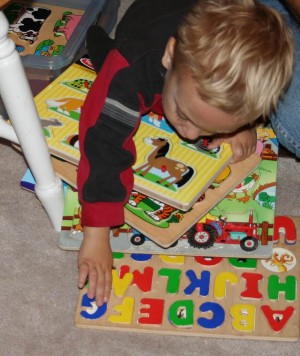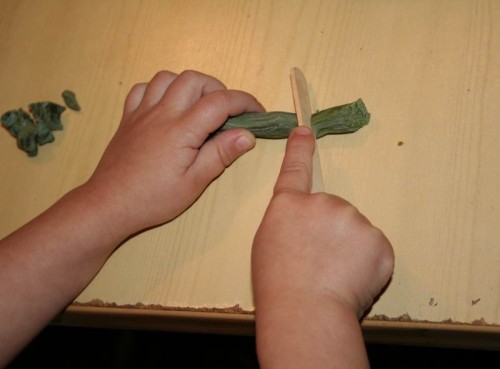How to Homeschool Preschool, Part 2


Invitee Mail service past Charity Hawkins, author of The Homeschool Experiement: a novel
Read Function 1 of this serial hither.
In the final post I talked nigh a workable daily routine for homeschooling preschoolers. In this postal service I desire to delve into the specifics. Hither's how those activities teach your child.
LIFE SKILLS / CHARACTER
I messed up with my first kid. I didn't have a great routine; I basically let him swallow whenever he wanted, accept terrible sleep habits, and call the shots for what we did a lot of the fourth dimension. I've wised upwardly.
Yous desire to assistance your kid constitute good habits, with the parents as the regime. With my first son we spent the first six-months of kindergarten (okay, fine, the whole twelvemonth) only getting him to obey with a good attitude. Help preschoolers cultivate an attitude of cheerfully helping and obeying.
These Little Jewel Books are super cheap ($3 each) and exercise a practiced job of reinforcing the thought of being a cheerful helper at dwelling house. My favorites are: But Four, Molly Helps Mother, Helping Mother, A Boy to Assistance .

Regular social interaction with other children is helpful. My three-year-old learns manners and sharing at domicile with his brother and sis, only he also gets practice at Sunday School, Awana Cubbies, and a homeschool co-op we go to one morn a week. When I had two preschoolers, they attended a Mother's Day Out blazon program. I don't think information technology was necessary for their academic or social evolution, only information technology was pretty helpful for my sanity. My guess is that your kid is around other children in some class, whether at church building or soccer class or with friends, but if non and you retrieve that is needed, then in that location are lots of good one-twenty-four hour period-a-calendar week programs or classes.
ACADEMICS
My iii-year-quondam might get an 60 minutes of reading plus an hr of other "academic" activities spread out through a normal mean solar day. The residue of his time is spent on playing, helping, joining in with whatever is going on in the house, nap, baths, meals, etc.

1. PRE-READING – There are and so manysplendid picture books out there. Iread to my 3-year-one-time son 1 or two books in the forenoon and again before his nap. Sometimes he gets a few while the older two are working on their school. My hubby reads him two books at bedtime. If y'all need ideas on wonderful picture books for these ages, I'd recommend Five in a Row books or the Sonlight books. I personally don't mess with affiliate books (with no pictures) until age five or then. There are so many wonderful picture books with rich vocabulary, Beatrix Potter for case, that in that location's no need to jump to affiliate books nevertheless.
Fifty-fifty more than actual books though, talking with preschoolers and telling them stories can fix them for language. I talk to my three-yr-old almost what we're doing, inquire him to follow simple instructions, and listen to his silly stories. Talking naturally falls into your day whatsoever you're doing; y'all don't have to schedule that. If we're waiting at a restaurant, for example, instead of looking to an app for entertainment, we tin can play iSpy, make upwards stories about the silverware, or colour. The other solar day while he got a haircut (and was incomparably unhappy almost it), I held him and told him a "Three Bears Story." This is our standard story, but I have the baby comport do any he's doing that twenty-four hour period. Nursery rhymes, songs and finger plays at the library all teach rhyming and linguistic communication.

Before the encephalon can exercise the center-tracking necessary for reading, it has to have mastered large-motor and fine-motor skills. So but equally important for reading as bodily books is that your preschooler uses his muscles a lot. Pushing the laundry basket down the hall is working his large muscle groups. Throwing dress into the washing auto crosses the mid-line of his trunk, which helps establish those cross-lateral connections in the brain that are so of import for afterward learning. (See Healy'south book for more on this.) Jumping outside is skilful. Climbing jungle gyms. Swimming. Gymnastics. Running in circles. Whacking at baseballs. All that energy they have? Great! It's God's way to assistance their bodies practise what they need. It IS schoolhouse.
For the actual ABCs, with my 3-year-old I use a couple of puzzles (likewise proficient for math and handwriting skills) and we talk about the messages. I relate each of them someone's proper name, like "M. for Mommy!" or "oh, that'southward a D. That says 'Duh' for Daddy." I likewise take been giving him a printout alphabetic character to colour from this site but mostly to keep him decorated while I practice schoolhouse with his brother and sister. He has improved a lot. About a month ago he'd scribble and be done in thirty seconds. Now he is at to the lowest degree attempting to color and working ii to 3 minutes, so that'due south quite the increase in attending span, right? That's very normal at this age. (Many girls might sit and color for 20 minutes though. That'southward probably normal as well.)
Your goal with the ABCs is to teach the letter sounds. "That'southward a B. It says 'buh.' " I teach short vowel sounds for the vowels. "A for 'aah' as in apple." That way once your preschooler knows her letters, she is gear up to first blending 3 alphabetic character words like C-A-T, probably in kindergarten. (See Jenae'due south book for more info on Instruction Your Child to Read.) I as well point out messages on signs we meet. Teaching letter sounds is phonics. (Blends like "ch" commonly come in kindergarten.)
Songs, Poetry, and Bible verses are easily memorized and teach language. I love the Steve Green Hide 'Em in Your Heart CDs for scripture. We heed in the machine to CDs. Whatever plant nursery rhymes count as poesy. Songs exercise too. These all lay the foundation for reading. Call back of it this way—when your kid starts reading in kindergarten if she'southward never heard of a word, she's going to have a hard time reading it. Past giving her rich vocabulary through books, memorized songs and poetry, and stories, yous "build the database" of rich linguistic communication for subsequently reading and writing.
(This is a fantastic presentation ($three) most language acquisition through reading and verse. In fact, I just listened to this tonight and if I had 1 educational resources to recommend to any parent, homeschooling or not, this is it.).
2. PRE-HANDWRITING – Forth with those large motor skills, preschoolers need to develop fine-motor skills to gear up them to concord a pencil and write messages and numbers in kindergarten.

a. Helping activities like wiping a table, sorting silverware, folding washcloths, digging in the garden, putting muffin liners in a muffin tray, groovy eggs, stirring, pouring, sweeping, Dustbusting, watering plants, helping cutting and arrange flowers or leaves for a centerpiece, cutting a banana with a butter knife. Scooping birdseed into the birdfeeder. Basically the kid version of your real work.
b. Sensory activities similar play-doh, playing in a sand box, digging, pouring dried beans, pouring water, making rolls, bathtub play, washing toys exterior. Lots of things outside provide this: sand, leaves, grass, water, etc.
c. Craft activities like cut with safety pair of scissors (nifty for fine motor), pasting, coloring, watercolor (cleans upwards hands) painting, playdoh.
d. Learning toys like puzzles, shape sorters, matching games, etc.
Almost everything they do fits the nib. (Except picking their noses. That's one fine motor activity I could alive without.)
This beautiful workbook is cheap ($iii) and gives your child exercise sitting in a chair, holding a pencil, etc. (Y'all'd be surprised at how much exercise it takes to not fall out of a chair. It'south astonishing.)

three. PRE-MATH – Math concepts are easy. Those happen all the fourth dimension in life. You can talk about the days of the week, sing songs, show him the months on the agenda. When you measure him against the wall, talk about inches. When y'all cook, talk virtually cups and teaspoons. When you counterbalance him, talk about pounds. Shapes and colors are everywhere—right now with my preschooler, I accept talked about squares, triangles, hearts, circles, and rectangles.
Tasks are great for math. When your daughter helps set the tabular array she'southward learning one-to-one correspondence (math). Putting abroad silverware is sorting skills (math). Folding washcloths is spatial skills. Cooking pancakes teaches the thought of measuring liquids and solids. All of these things besides teach following directions, retentivity skills, and vocabulary (pre-reading).
I take taught my three-year-old counting with fingers and toes, grapes at snack time, and putting apples into the purse at the store. When I'm educational activity a kid to count, I affect their finger to the object as we count. Board games often teach counting when you move your piece. Hopscotch is fun for number recognition.
And so we work on recognizing the numerals, so near four, he'll outset writing the numerals. (For that, I Honey this sweet little booklet ($3). That alone prepared my daughter for her kindergarten math curriculum.)
After that, and into kindergarten, you tin play easy "add" or "have abroad" games.

Scientific discipline– Right now your kid is exploring everything. With my three-year-sometime, we await at daffodils and ducks, birds and butterflies. We feel snow and rain and hail. He helps the states dig in the garden. He'southward learning virtually the seasons, which is office of the curriculum at about preschools. Well-nigh years we watch caterpillars turn into butterflies.
HISTORY / LANGUGAE / ART / MUSIC — History is over the head of preschoolers. They don't understand past, present, and futurity well enough to grasp that, so don't worry about history. If you know another language, why not say some things in that language? Nosotros read Spanish books and some soaks in, but just equally information technology comes upwards. Whatever yous are passionate about will come through to your preschooler. If y'all are musical, you'll sing. If you dearest art and nature, as I do, you will signal out things virtually art and nature. If y'all speak Chinese, your preschooler volition learn Chinese. Simply none of those things is necessary.
Think about the typical preschool. Much of what they practise and larn is about the life that they would be living if they weren't in schoolhouse. I'grand not saying that's bad, but you are giving them the actual experiences in your domicile. Y'all have the luxury of getting to go to the farm and see the sheep, or plant the actual plant in the actual garden, or make real bread. It's wonderful.
If you focus on the basics: character, play, and some academics (pre-reading, pre-handwriting, pre-math), your preschooler will accept an excellent foundation for kindergarten.
If y'all exercise decide to homeschool preschool, just bank check to see if there are any requirements in your land. I believe most states do not take them for preschool, only double bank check to make sure.
I had so many resources to share, including more ideas for older preschoolers (4s and 5s), that I had to make a separate resources folio. That has a lot more than information.
Please let me know what questions you lot take. Does that make sense? Are you considering homeschooling? What worries you the most? I'yard happy to effort to reply any questions if I can.
Charity Hawkins is the writer of The Homeschool Experiment: a novel .. She lives, writes, and tries to keep her preschooler from picking his nose in Tulsa, Oklahoma.
grasssamissing1973.blogspot.com
Source: https://www.icanteachmychild.com/how-to-homeschool-part-2/
0 Response to "How to Homeschool Preschool, Part 2"
Post a Comment